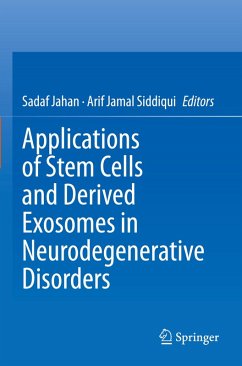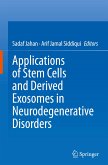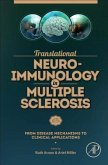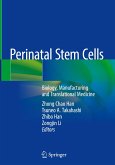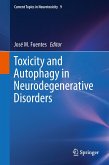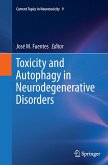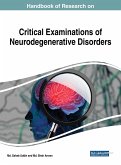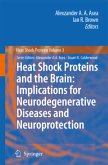Applications of Stem Cells and derived Exosomes in Neurodegenerative Disorders
Herausgegeben:Jahan, Sadaf; Siddiqui, Arif Jamal
Applications of Stem Cells and derived Exosomes in Neurodegenerative Disorders
Herausgegeben:Jahan, Sadaf; Siddiqui, Arif Jamal
- Broschiertes Buch
- Merkliste
- Auf die Merkliste
- Bewerten Bewerten
- Teilen
- Produkt teilen
- Produkterinnerung
- Produkterinnerung
This book explores the therapeutic approaches of stem cells and stem cell-derived exosomes against neurodegenerative disorders (NDDs). The initial chapters introduce different neurodegenerative diseases and discuss the mechanistic aspects of their progression. The subsequent chapters cover strategies for the isolation, characterization, and differentiation of stem cells. In turn, the book reviews the protective role of stem cells against neurological disorders and examines regenerative approaches to treat neurological diseases using mesenchymal stem cells. The book also presents induced…mehr
Andere Kunden interessierten sich auch für
![Applications of Stem Cells and derived Exosomes in Neurodegenerative Disorders Applications of Stem Cells and derived Exosomes in Neurodegenerative Disorders]() Applications of Stem Cells and derived Exosomes in Neurodegenerative Disorders132,99 €
Applications of Stem Cells and derived Exosomes in Neurodegenerative Disorders132,99 €![Translational Neuroimmunology in Multiple Sclerosis Translational Neuroimmunology in Multiple Sclerosis]() Translational Neuroimmunology in Multiple Sclerosis79,99 €
Translational Neuroimmunology in Multiple Sclerosis79,99 €![Perinatal Stem Cells Perinatal Stem Cells]() Perinatal Stem Cells74,99 €
Perinatal Stem Cells74,99 €![Toxicity and Autophagy in Neurodegenerative Disorders Toxicity and Autophagy in Neurodegenerative Disorders]() Toxicity and Autophagy in Neurodegenerative Disorders74,99 €
Toxicity and Autophagy in Neurodegenerative Disorders74,99 €![Toxicity and Autophagy in Neurodegenerative Disorders Toxicity and Autophagy in Neurodegenerative Disorders]() Toxicity and Autophagy in Neurodegenerative Disorders74,99 €
Toxicity and Autophagy in Neurodegenerative Disorders74,99 €![Handbook of Research on Critical Examinations of Neurodegenerative Disorders Handbook of Research on Critical Examinations of Neurodegenerative Disorders]() Handbook of Research on Critical Examinations of Neurodegenerative Disorders352,99 €
Handbook of Research on Critical Examinations of Neurodegenerative Disorders352,99 €![Heat Shock Proteins and the Brain: Implications for Neurodegenerative Diseases and Neuroprotection Heat Shock Proteins and the Brain: Implications for Neurodegenerative Diseases and Neuroprotection]() Heat Shock Proteins and the Brain: Implications for Neurodegenerative Diseases and Neuroprotection166,99 €
Heat Shock Proteins and the Brain: Implications for Neurodegenerative Diseases and Neuroprotection166,99 €-
-
-
This book explores the therapeutic approaches of stem cells and stem cell-derived exosomes against neurodegenerative disorders (NDDs). The initial chapters introduce different neurodegenerative diseases and discuss the mechanistic aspects of their progression. The subsequent chapters cover strategies for the isolation, characterization, and differentiation of stem cells. In turn, the book reviews the protective role of stem cells against neurological disorders and examines regenerative approaches to treat neurological diseases using mesenchymal stem cells. The book also presents induced pluripotent stem cell (iPSC) technology for cellular therapy, drug screening, and in-vitro modeling of neurodegenerative diseases. Lastly, the book discusses the role of stem cells and derived exosomes as a novel therapeutic agent against Alzheimer's and Parkinson's disease and in associated signaling molecules involved in neuroprotection. This book is an invaluable source for researchers working towards understanding the potential of stem cell therapy in neurodegenerative disorders.
Produktdetails
- Produktdetails
- Verlag: Springer / Springer Nature Singapore / Springer, Berlin
- Artikelnr. des Verlages: 978-981-99-3850-6
- 2023
- Seitenzahl: 344
- Erscheinungstermin: 10. September 2024
- Englisch
- Abmessung: 235mm x 155mm x 19mm
- Gewicht: 523g
- ISBN-13: 9789819938506
- ISBN-10: 9819938503
- Artikelnr.: 71533082
- Herstellerkennzeichnung Die Herstellerinformationen sind derzeit nicht verfügbar.
- Verlag: Springer / Springer Nature Singapore / Springer, Berlin
- Artikelnr. des Verlages: 978-981-99-3850-6
- 2023
- Seitenzahl: 344
- Erscheinungstermin: 10. September 2024
- Englisch
- Abmessung: 235mm x 155mm x 19mm
- Gewicht: 523g
- ISBN-13: 9789819938506
- ISBN-10: 9819938503
- Artikelnr.: 71533082
- Herstellerkennzeichnung Die Herstellerinformationen sind derzeit nicht verfügbar.
Dr. Sadaf Jahan is currently working as Assistant professor in the Department of Medical Laboratories, College of Applied Medical Sciences, Majmah University, Saudi Arabia. She has earlier served as Assistant Professor (Microbiology) in the department of Microbiology; Chinmaya Degree College, H.N.B. Garhwal University, Haridwar, India. (2018-2019). Previously, she has also been worked as a National Post-Doctoral Fellowship through DST-Science and Engineering Research Board (SERB) at CSIR-Central Drug Research Institute, Lucknow, India between 2016 and 2018. In 2009, she qualified a National Level Exam (UGC CSIR NET-JRF) in Life Sciences and pursue a PhD in Biological Sciences in 2010 at CSIR- Indian Institute of Toxicology Research (IITR), Lucknow, India through AcSIR - Academy of Scientific and Innovative Research, New Delhi, India and completed her PhD in 2015. Her research experience and interest are broadly focused on developing and validating invitro model systems to study developmental neurotoxicity of environmental chemicals and drugs using chemical induced differentiating neural cells, derived from human umbilical cord blood stem cells. She is editorial board member of Biotechnology and Bioinformatics. She has served as referee for a number of international journals, including MDPI (Biomolecules, Pharmaceuticals, Frontiers in Genetics, Frontiers, JCM); SAGE Open Medical Case Reports; International placenta stem cell society (IPLASS); Oxidative Medicine and Cellular Longevity; Scientific Reports; PLoS One; Toxicology International etc. She has more than 10 years of research experience in neurosciences and stem cells. She has also published more than 80 research articles in the peer-reviewed international journal and authored or co-authored many book chapters. She is a member of many international scientific societies and organizations importantly, international placenta stem cell society (IPLASS), International Society for Neurochemistry (ISN) & American Society for Neurochemistry, Life Member of Indian Academy of Neuroscience (IAN), India, Life Member of Society of Free Radical Research (SFRR), India. She has reviewed more than 100 manuscripts for reputed journals. She is running several projects as PI (principal investigator) or Co-PI obtain from Deanship of Research, Majmaah University as well as other Saudi university. Since 2020 to present, she is also a member of Quality Assurance Committee at the department of Medical Laboratories, Majmaah University, Saudi Arabia. Dr. Arif Jamal Siddiqui is an Assistant Professor and Principal Investigator at the Department of Biology, College of Science, University of Hail, Saudi Arabia. He received his PhD from CSIR-Central Drug Research Institute, Lucknow, India in 2015. From 2015 to 2018, he worked as a Post-Doctoral Fellow at Texas Tech University Health Sciences Center, Lubbock, Texas, United States of America. He has more than 12 years of experience in research, teaching and administration. In his professional work, he has received research grants as a Principal Investigator from various renowned organizations. He has successfully published more than 90 publications in internationally recognized peer-reviewed prestigious journals, published several book chapters for internationally renowned publishers and presented many articles and posters in various conferences/workshops worldwide. He is Associate Editor of 3 Biotech (Springer Nature), Academic Editor of Journal of Immunology Research, Stem Cell International, BioMed Research International, Canadian Journal of Infectious Disease, Medical Microbiology (Hindawi), PeerJ and other journal involve as an Editorial board member. His research experience and interest are to study host-parasites interaction, role of stem cells in neuro-disorder diseases, Immune response (specific T, B, MQ, Dendritic cells and specific memory T, B related study) during parasite interaction, drug and vaccine development against parasites infection. Presently, he working on parasite diversity, novel role of stem cells in various neuro-related diseases, natural bioactive compound role in cancer, Immune behaviors & responses, diagnosis and vaccine development of Schistosoma mansoni, Schistosoma japonicum and Schistosoma haematobium (Trematode worm) and Plasmodium parasites (Malaria). Furthermore, he is a member of The Indian Science Congress Association, India and the Annals of Parasitology, Poland. He has reviewed more than 180 manuscripts and he has edited more than 100 manuscripts. He is running several project as PI (principle investigator) or Co-PI obtain from Deanship of Research, University of Hail as well as other Saudi university.
Chapter 1. History, origin and types of neurological disorders.- Chapter 2. Mechanistic approach involved in the progression of Neurodegenerative disorders.- Chapter 3. Isolation, characterization and differentiation of stem cells.- Chapter 4. Role of Stem cells as a protective agent against neurological complications.- Chapter 5. Mesenchymal stem cells and their application against neurodegenerative disorders.- Chapter 6. iPSCs and their role in amelioration of neurodegenerative disorders.- Chapter 7. Isolation, characterization and detailed history of exosomes derived from stem cells and their epigenetic biology.- Chapter 8. Stem cells vs exosomes: promising therapeutic approach and biomarkers agent against neurodegenerative disorders.- Chapter 9. Role of stem cells and derived exosomes as a novel therapeutic agent against neuroinflammation and stroke.- Chapter 10. Role of stem cells and derived exosomes as a novel therapeutic agent against Alzheimer's and Parkinson's disease.- Chapter 11. Role of stem cells and derived exosomes and associated signalling molecules involved in neuroprotection.- Chapter 12. Exosome as nanoparticles against neurodegenerative disorders.
Chapter 1. History, origin and types of neurological disorders.- Chapter 2. Mechanistic approach involved in the progression of Neurodegenerative disorders.- Chapter 3. Isolation, characterization and differentiation of stem cells.- Chapter 4. Role of Stem cells as a protective agent against neurological complications.- Chapter 5. Mesenchymal stem cells and their application against neurodegenerative disorders.- Chapter 6. iPSCs and their role in amelioration of neurodegenerative disorders.- Chapter 7. Isolation, characterization and detailed history of exosomes derived from stem cells and their epigenetic biology.- Chapter 8. Stem cells vs exosomes: promising therapeutic approach and biomarkers agent against neurodegenerative disorders.- Chapter 9. Role of stem cells and derived exosomes as a novel therapeutic agent against neuroinflammation and stroke.- Chapter 10. Role of stem cells and derived exosomes as a novel therapeutic agent against Alzheimer's and Parkinson's disease.- Chapter 11. Role of stem cells and derived exosomes and associated signalling molecules involved in neuroprotection.- Chapter 12. Exosome as nanoparticles against neurodegenerative disorders.

